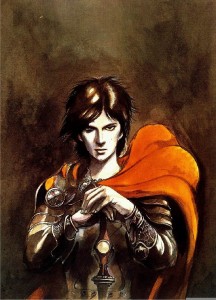
Corum Jhaelen Irsei is the name of a fictional fantasy hero in a series of novels written by Michael Moorcock. The character was introduced in the novel The Knight of Swords, published in 1971. This was followed by two other books published during the same year, The Queen of Swords and The King of Swords. The three novels are collectively known as the "Corum Chronicles trilogy" or "the Chronicles of Corum". Both The Knight of the Swords and The King of the Swords won the August Derleth Award in 1972 and 1973 respectively. The character then starred in three books making up the "Silver Hand trilogy", and has appeared in other stories taking place in Moorcock's multiverse.

Lyon Sprague de Camp was an American writer of science fiction, fantasy and non-fiction. In a career spanning 60 years, he wrote over 100 books, including novels and works of non-fiction, including biographies of other fantasy authors. He was a major figure in science fiction in the 1930s and 1940s.
Contemporary fantasy, also known as modern fantasy, is a subgenre of fantasy, set in the present day or, more accurately, the time period of the maker. It is perhaps most popular for its subgenre, urban fantasy.

Warhammer Fantasy is a fictional fantasy universe created by Games Workshop and used in many of its games, including the table top wargame Warhammer Fantasy Battle, the Warhammer Fantasy Roleplay (WFRP) pen-and-paper role-playing game, and a number of video games: the MMORPG Warhammer Online: Age of Reckoning, the strategy games Total War: Warhammer, Total War: Warhammer II and Total War: Warhammer III and the two first-person shooter games in the Warhammer Vermintide series, Warhammer: End Times - Vermintide and Warhammer: Vermintide 2.
Faerûn is a fictional continent and is the primary setting of the Dungeons & Dragons world of Forgotten Realms. It is described in detail in several editions of the Forgotten Realms Campaign Setting with the most recent being the 5th edition from Wizards of the Coast, and various locales and aspects are described in more depth in separate campaign setting books. Around a hundred novels and several computer and video games use Faerûn as the setting.
Abeir-Toril is the fictional planet that makes up the Forgotten RealmsDungeons & Dragons campaign setting, as well as the Al-Qadim and Maztica campaign settings and the 1st edition version of the Oriental Adventures campaign setting.
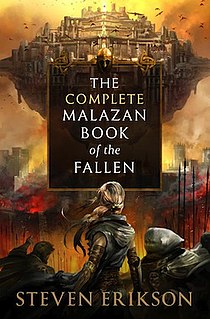
Malazan Book of the Fallen is a series of epic fantasy novels written by the Canadian author Steven Erikson. The series, published by Bantam Books in the U.K. and Tor Books in the U.S., consists of ten volumes, beginning with Gardens of the Moon (1999) and concluding with The Crippled God (2011). Erikson's series is extremely complex with a wide scope, and presents the narratives of a large cast of characters spanning thousands of years across multiple continents.
The flexibility of the Dungeons & Dragons (D&D) game rules means that Dungeon Masters (DM) are free to create their own fantasy campaign settings. For those who wanted a pre-packaged setting in which to play, TSR, Wizards of the Coast (WotC), and other publishers have created many settings in which D&D games can be based; of these, the Forgotten Realms, an epic fantasy world, has been one of the most successful and critically acclaimed settings. Many campaign settings include standard sword and sorcery environments, while others borrow Asian, Central American, swashbuckling, horror and even space-travel themes.
The lost world is a subgenre of the fantasy or science fiction genres that involves the discovery of an unknown Earth civilization. It began as a subgenre of the late-Victorian adventure romance and remains popular into the 21st century.
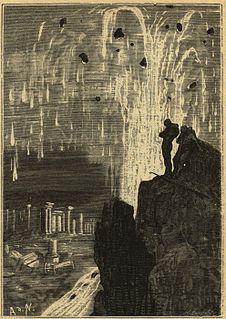
The island of Atlantis has often been depicted in literature, television shows, films and works of popular culture.

The Honorable Barbarian is a fantasy novel by American writer L. Sprague de Camp, the fifth and final book of his Novarian series. It is a sequel both to the "Reluctant King" trilogy and to the Novarian sequence's only short story, "The Emperor's Fan". It was first published in hardcover by Del Rey Books in July 1989, with a limited edition hardcover following from The Easton Press in its "Signed First Editions of Science Fiction" series in August of the same year. Another hardcover edition issued by Del Rey in conjunction with the Science Fiction Book Club appeared in January 1990. The first paperback edition was issued by Del Rey in May 1990. The novel has also been translated into French. An E-book edition was published as The Honourable Barbarian by Gollancz's SF Gateway imprint on September 29, 2011 as part of a general release of de Camp's works in electronic form.
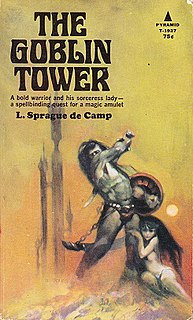
The Goblin Tower is a fantasy novel by American writer L. Sprague de Camp, the first book of both his Novarian series and the "Reluctant King" trilogy featuring King Jorian of Xylar. It is not to be confused with the collection of poetry by the same title by Frank Belknap Long. De Camp's novel was first published as a paperback by Pyramid Books in 1968. It was reprinted by Del Rey Books in December 1983, July 1987, and July 1989. It was later gathered together with its sequels The Clocks of Iraz (1971) and The Unbeheaded King (1983) into the omnibus collection The Reluctant King. The first independent hardbound edition was issued by HarperCollins in 1987. An E-book edition was published by Gollancz's SF Gateway imprint on September 29, 2011 as part of a general release of de Camp's works in electronic form. The novel has been translated into French, Italian and German.

The Clocks of Iraz is a fantasy novel by American writer L. Sprague de Camp, the second book of both his Novarian series and the "Reluctant King" trilogy featuring King Jorian of Xylar. It was first published as a paperback by Pyramid Books in 1971. It was reprinted by Del Rey Books in December 1983, March 1984, and July 1989. It was later gathered together with the other books in the trilogy, The Goblin Tower (1968) and The Unbeheaded King (1983), into the omnibus collection The Reluctant King. An E-book edition was published by Gollancz's SF Gateway imprint on September 29, 2011, as part of a general release of de Camp's works in electronic form. The novel has been translated into Portuguese, Italian, French, German and Dutch.
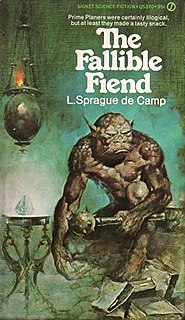
The Fallible Fiend is a fantasy novel by American writer L. Sprague de Camp, the third book of his Novarian series. It was first published as a two-part serial in the magazine Fantastic for December 1972 and February 1973, and subsequently expanded and revised for book publication. The novel was first published in book form as a paperback by Signet Books in 1973; it was later reprinted by Remploy (1974), Sphere (1978), Del Rey/Ballantine (1981), Baen (1992) and the Thorndike Press (2002). The Remploy edition was both the first British and first hardcover edition. An e-book edition was published by Gollancz's SF Gateway imprint on September 29, 2011 as part of a general release of de Camp's works in electronic form. It has also been translated into German and Italian.

"The Emperor's Fan" is a fantasy short story by American writer L. Sprague de Camp, the fourth of his Novarian series. It was first published in Astounding: The John W. Campbell Memorial Anthology, edited by Harry Harrison, in 1973. It has since been reprinted in other anthologies, including The Year's Best Fantasy Stories, edited by Lin Carter (1975), as well as such collections of de Camp's work as The Best of L. Sprague de Camp (1978) and Footprints on Sand (1981). It has also been translated into German.
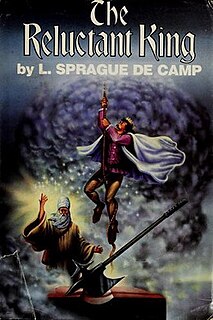
The Novarian series is a sequence of fantasy stories by L. Sprague de Camp, published between 1968 and 1989. The series contains some of de Camp's most innovative works of fantasy, featuring explorations of various political systems, an inversion of the "rags to royalty" pattern characteristic of much heroic fantasy, a satiric look at the foibles of humanity through the eyes of a demon, and a consistently wry and ironic take on conventions of the genre that plays out by taking them to their logical conclusions. Another singular feature of the series is its frequent use of folk tales integrated into the plot to painlessly convey something of the background and history of the invented world. This device obviates the need for lengthy appendices, as in The Lord of the Rings.
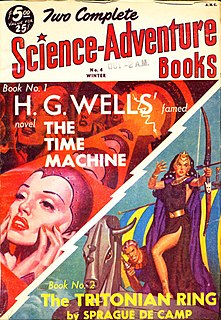
The Tritonian Ring is a heroic fantasy novel written by L. Sprague de Camp as part of his Pusadian series. It was first published in the magazine Two Complete Science Adventure Books for Winter, 1951, and first appeared in book form in de Camp's collection The Tritonian Ring and Other Pusadian Tales. Its first publication as a stand-alone novel was as a paperback by Paperback Library in 1968; the first hardcover edition was from Owlswick Press in 1977. An E-book edition was published as The Tritonian Ring and Other Pasudian [sic] Tales by Gollancz's SF Gateway imprint on September 29, 2011 as part of a general release of de Camp's works in electronic form.

The Unbeheaded King is a fantasy novel by American writer L. Sprague de Camp, the fourth book of his Novarian series and the third in the "Reluctant King" trilogy featuring King Jorian of Xylar. It was first published as a hardcover by Del Rey Books in March 1983 and later reprinted in paperback in December 1983 and July 1989 by the same publisher. It was later gathered together with the other books in the trilogy, The Goblin Tower (1968) and The Clocks of Iraz (1971), into the omnibus collection The Reluctant King. An E-book edition was published by Gollancz's SF Gateway imprint on September 29, 2011 as part of a general release of de Camp's works in electronic form.
Bibliography of science fiction, fantasy, historical fiction and nonfiction writer L. Sprague de Camp:













